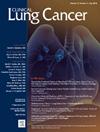Predictors of Up-To-Date Lung Cancer Screening Among Eligible People in the United States: A Nationally Representative Dataset
IF 3.3
3区 医学
Q2 ONCOLOGY
引用次数: 0
Abstract
This study examines the factors associated with up-to-date lung cancer screening (UTD-LCS) among eligible adults. We analyzed survey data from the 2022 Behavioral Risk Factor Surveillance System (BRFSS) and selected participants eligible for LCS. Logistic regression models were used to examine the relationship between UTD-LCS and various factors, including demographics, mental and physical health, and access to healthcare. Among the respondents (Weighted N = 13,037,747), 8.18% were eligible for LCS. However, only 24.53% of those eligible had undergone screening in the past year. Individuals who self-identified as Asian (OR = 0.77, P = .008), American Indian (OR = 0.78, P = .002), and Hispanic (OR = 0.79, P = .006) were significantly less likely to participate in LCS screening. In contrast, married individuals (OR = 1.07, P = .019) and older adults aged 70 to 80 years (OR = 1.78, P < .001) were more likely to have undergone screening. Additionally, a poor physical health status was associated with UTD-LCS, as having more days of poor health increased the odds of screening (for 14 days or more: OR = 1.28, P < .001). Finally, having insurance (private plan: OR = 3.7, P < .001) and not experiencing medical cost issues (OR = 1.13, P = .025) were also associated with greater odds of being up-to-date on lung cancer screening. Our results underscore the need for targeted public health interventions that increase awareness and accessibility of LCS. The study also emphasizes the critical role of primary care providers in promoting screening.
在美国符合条件的人群中最新肺癌筛查的预测因素:一个具有全国代表性的数据集。
本研究探讨了符合条件的成年人中与最新肺癌筛查(UTD-LCS)相关的因素。我们分析了2022年行为风险因素监测系统(BRFSS)的调查数据,并选择了符合LCS条件的参与者。使用逻辑回归模型来检查UTD-LCS与各种因素之间的关系,包括人口统计、心理和身体健康以及获得医疗保健的机会。在被调查者中(加权N = 13,037,747), 8.18%的人符合LCS的条件。然而,在过去一年中,只有24.53%的符合条件的人接受了筛查。自认为是亚洲人(OR = 0.77, P = 0.008)、美洲印第安人(OR = 0.78, P = 0.002)和西班牙裔(OR = 0.79, P = 0.006)的个体参加LCS筛查的可能性显著降低。相比之下,已婚人士(OR = 1.07, P = 0.019)和70至80岁的老年人(OR = 1.78, P < 0.001)更有可能接受筛查。此外,身体健康状况不佳与UTD-LCS相关,因为健康状况不佳的天数越多,筛查的几率就越大(14天或更长:or = 1.28, P < .001)。最后,有保险(私人计划:OR = 3.7, P < .001)和没有医疗费用问题(OR = 1.13, P = .025)也与更大的机会进行最新的肺癌筛查相关。我们的结果强调需要有针对性的公共卫生干预措施,以提高LCS的认识和可及性。该研究还强调了初级保健提供者在促进筛查方面的关键作用。
本文章由计算机程序翻译,如有差异,请以英文原文为准。
求助全文
约1分钟内获得全文
求助全文
来源期刊

Clinical lung cancer
医学-肿瘤学
CiteScore
7.00
自引率
2.80%
发文量
159
审稿时长
24 days
期刊介绍:
Clinical Lung Cancer is a peer-reviewed bimonthly journal that publishes original articles describing various aspects of clinical and translational research of lung cancer. Clinical Lung Cancer is devoted to articles on detection, diagnosis, prevention, and treatment of lung cancer. The main emphasis is on recent scientific developments in all areas related to lung cancer. Specific areas of interest include clinical research and mechanistic approaches; drug sensitivity and resistance; gene and antisense therapy; pathology, markers, and prognostic indicators; chemoprevention strategies; multimodality therapy; and integration of various approaches.
 求助内容:
求助内容: 应助结果提醒方式:
应助结果提醒方式:


